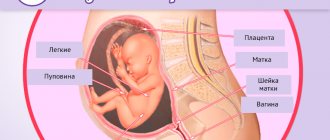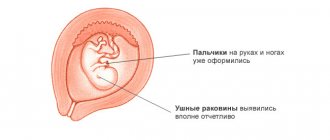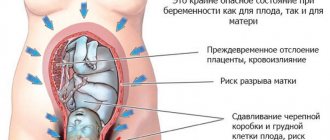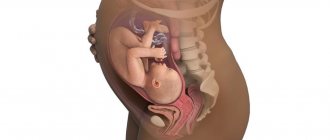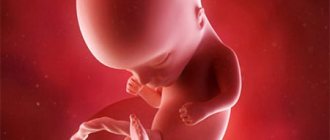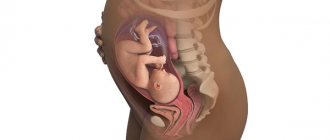Two views on the deadline
For convenience, any doctor will count from the first day of a woman’s last menstruation. The concept of obstetric term is based on this system. According to another system (embryonic), the period is calculated from the middle of the cycle. It is at this time that ovulation and conception most often occur.
In obstetric practice, the third week is the period of fertilization . The egg has matured and is moving towards the uterine cavity. At some point, a sperm penetrates into it, and then the zygote will continue to move. This new cell has a full set of chromosomes and is capable of dividing very quickly.
According to the embryonic method, once a single cell is already developing vigorous activity and actively living its special, hidden life. What about the expectant mother? If she doesn’t yet know exactly about her pregnancy, she probably guesses. After all, her period is already about a week late.
In order not to get confused in the lines , read a detailed article about this (terms of pregnancy: obstetric and embryonic).
From guesswork to certainty
Three weeks after conception, a pharmacy test will show those same two stripes. At the same time, the level of the hCG hormone in the woman’s body will increase. An appropriate blood test will confirm pregnancy. But if we talk about the obstetric third week, pregnancy has barely begun and is not yet determined. Moreover, a woman can still get her period.
According to medical research, 70-75% of fertilized eggs are rejected by the female body even before they are fixed in the uterine cavity. This happens for many reasons:
- initial cellular defects;
- hormonal disorders;
- infectious diseases;
- stress.
Sometimes rejection occurs without any prerequisites at all. Since the embryo has not actually begun to develop, this phenomenon is not considered a miscarriage. The woman may, in principle, not know what happened. For her, one day the next menstruation will simply come.
Signs of pregnancy at this stage
If the pregnancy was still in doubt, then at this stage the mother will easily find out about it with the help of a pharmacy test, which, as expected, will show the woman two cherished stripes. Human chorionic hormone has already begun to rise and continues to double every 48 hours. If the pregnancy was unwanted, then at this stage the patient will still be able to undergo a pharmaceutical termination or mini-abortion. Such procedures are less dangerous for the body and reproductive system of a woman.
If the fertilization that occurred was desired, then it’s time for mommy to realize her future motherhood and prepare for the upcoming changes. One of the signs indicating pregnancy at this particular time is the absence of regular menstruation. Gynecologists call this period embryonic.
Although the signs of conception are individual, there are some symptoms that are typical for most patients:
- Basal temperature indicators increase;
- Increased mammary sensitivity;
- Increased fatigue is a concern;
- Unusual taste preferences appear, appetite changes;
- Pregnancy is also characterized by sudden mood swings;
- If early toxicosis occurs, the woman is concerned about nausea;
- Urination becomes more frequent;
- Sensitivity to various pungent odors increases, olfactory receptors become more sensitive;
- During this period, there is a noticeable increase in the blood of progesterone hormone, which relaxes the uterine and intestinal muscles, which leads to the development of digestive disorders;
- Sometimes after implantation of an embryo, a woman experiences implantation bleeding, which is not accompanied by pain.
Such symptoms are not necessary, some manifestations may not exist, so you should not look for any abnormalities in yourself if any of the signs are absent.
Unwanted pregnancy
The third week from conception is the time to make a decision if pregnancy was not only not planned, but also not allowed.
Anything can happen in life. In fact, no method of contraception is 100% guaranteed. And sometimes partners treat this important issue carelessly. In any case, if you terminate an unwanted pregnancy, then now. Only the decision to have an abortion must be balanced and made with full responsibility. Any actions must take place according to the instructions and under the supervision of a physician. “Amateur action” here can lead to the most unfavorable consequences.
Why is the study done and to whom is it recommended?
The three-week period refers to the early stage of fetal development, which lasts about 10 weeks. Next, the embryo becomes an embryo and takes on human shape.
At week 3, a woman often doesn’t even know that a baby is developing inside.
Hormonal changes and biochemical processes in her body have already started, but visually nothing has changed yet.
Important! It is at the 3rd week from conception that it is determined whether the pregnancy continues to develop, or whether the egg, not implanted correctly, is removed from the body through the bloodstream.
So, why do you need an ultrasound examination at 3 weeks?
- In order to find out the cause of the delay (pregnancy or inflammation).
- To start treatment on time, if necessary.
- To exclude ectopic pregnancy, which has become more common in recent years.
- To confirm or refute the results of a pharmacy pregnancy test.
Feelings of the expectant mother
In the third obstetric week, everything goes as usual for a woman. But three weeks after conception there can be a lot of new experiences.
For example, a woman begins to accurately recognize dark and light grapes by smell. Even if before she could not boast of a keen sense of smell at all. And then she begins to be incredibly irritated by the smell of the eau de toilette of her beloved man.
Food tastes may also change. Sauerkraut or cucumbers become perhaps the most delicious foods, and your favorite type of cheese suddenly causes disgust. Perhaps this is a prelude to taste quirks. Among future and established fathers, there are whole legends about wives who ate herring with sour cream or demanded strawberries in February.
And the most active and lively woman suddenly turns into a “sleeping beauty.” It seems like you have complete rest and no overwork. But at the same time, more than anything else, I want to fall asleep.
All such sensations arise in a woman due to hormonal and physical changes. The body is intensely tuned to work in a special mode . The expectant mother may also note:
- increased breast sensitivity, especially nipples;
- frequent visits to the toilet due to relaxation of the smooth muscles of the intestines and increased activity of the ureters;
- periodic constipation;
- nausea (which may result in vomiting).
What will others notice?
Objective signs are absent in the third obstetric week, but can be very noticeable with an embryonic approach. The test or blood test has probably been done and confirmation has been received. Thoughts about the baby can significantly affect the appearance of the expectant mother. She becomes more feminine, graceful and seems to blossom.
However, at the same time, a woman can suddenly “break down” and become irritated. Relatives or loved ones will see a noticeable increase or decrease in appetite.
During a medical examination, the doctor will note specific symptoms: breast swelling and an increase in the size of the patient’s uterus.
Embryo or fetus? What's going on inside?

From an obstetric point of view, in the third week a full-fledged pregnancy has not yet occurred. For now, the uterus is preparing to receive a fertilized egg.
Everything is different if you count from conception. Although the embryo is still a collection of cells, similar to a berry, sex formation is already beginning . While at the same cellular level, real sexual characteristics will not appear soon.
If the embryo has not yet implanted in the uterine cavity, now this will definitely happen. The whole process is quite complex, it takes about forty hours. First of all, the embryo produces a particularly important immunopressor protein. The fact is that half of the embryo’s cells are foreign to the mother’s body - after all, they “came” from the child’s father. Without a special protein “signal” the uterus will never accept the future fetus - the immune system will not allow it.
The fixation of the embryo in the uterus gives rise to another important process. This is the formation of the placenta . Through it, the fetus in the womb receives all the necessary nutrients.
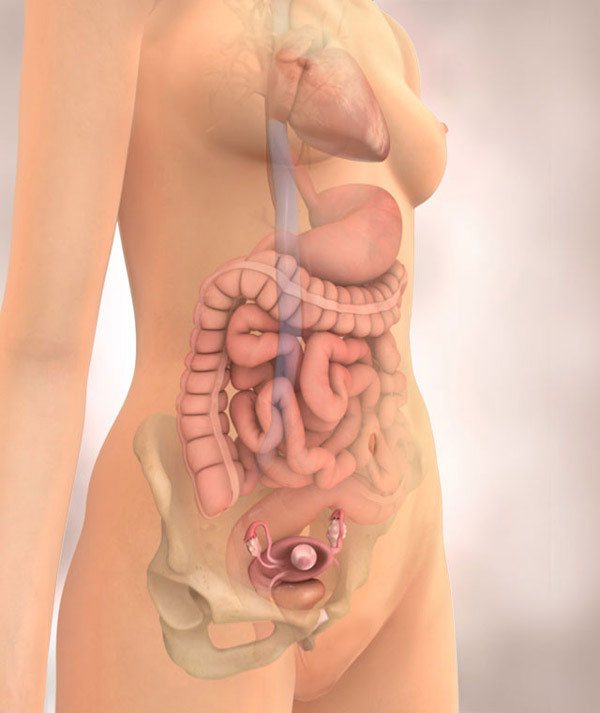
What does the future child look like? So far everything is quite prosaic. The embryo is in the morula stage - a dense round lump of cells. The morula quickly turns into a blastocyst. This means that a cavity with fetal fluid is formed inside the lump, in which the baby will then develop.
The size of the fetus (embryo) is negligible . By the end of the third week after conception, it has a diameter of 0.1-0.2 mm, and its weight is 2-3 micrograms (mcg, one thousandth of a gram). And in this tiny grain of sand there are already about 250 living cells. Very soon the formation and development of the main systems of the fetal body will begin, and the tiny heart will count its first beats.
Ectopic pregnancy
The term seems to speak for itself. Theoretically, in addition to the uterus, a fertilized egg can implant in other areas of the female reproductive system (for example, on the ovary or in the fallopian tube).
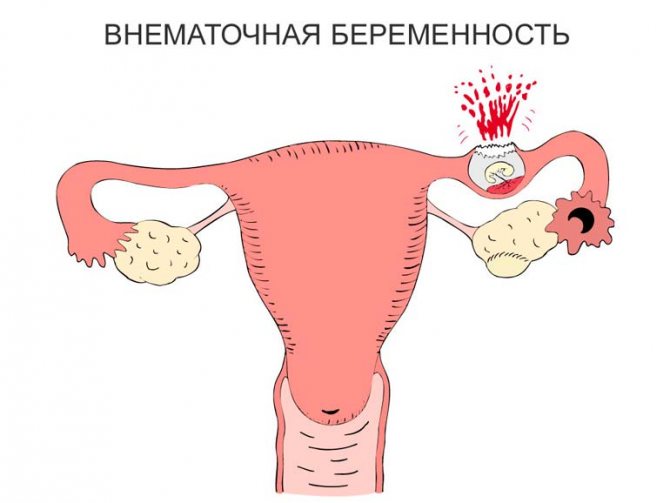
The percentage of ectopic pregnancies is very small, but the sad possibility always exists. When to suspect something is wrong? Severe growing pain is the first signal of possible problems . In this case, the stomach hurts not from below, but from the left or right. This is usually the site where the embryo is not implanted properly. The pain intensifies when the doctor palpates. The most experienced specialists can even determine the location of implantation.
Nowadays, gentle methods have been developed to get rid of ectopic pregnancy. They do not give negative consequences and do not interfere with motherhood in the future.
Spontaneous termination of pregnancy
A miscarriage is the rejection of a fetus already implanted in the uterine cavity . It can be triggered by many factors. The main signs are bleeding or constant spotting, sharp pain and pulling sensations in the lower abdomen and lower back. The consequences depend on how quickly the woman herself and the doctors reacted.
It is important for the expectant mother to remember that mild pain is common in the early stages of pregnancy. The same hormonal changes are to blame. The body adapts to the new state, and the lower back and lower abdomen “respond” to this.
Frozen pregnancy
During pregnancy, 3 weeks from the moment of conception, freezing sometimes occurs . Then the test (both pharmacy and hCG) first confirms the pregnancy, and then seems to “no longer see” it. However, my period does not come. Detection of a frozen pregnancy requires a careful approach and thorough diagnosis.
Alcohol in the third, important week of pregnancy
This is the most dangerous enemy of pregnancy in the third week. Now a kind of natural selection is taking place. Alcohol inhibits a protein that suppresses the immune system in the third week of pregnancy.
A weakened or, so to speak, defective embryo will not withstand the impact of alcohol and will die, while a healthier and stronger embryo will survive.
So that you do not take this as advice on forced termination of pregnancy at 3 weeks, it is worth noting that alcohol is generally alien to the human body. If nicotine is produced by a special gland for the decomposition of amino acids, then alcohol is 100% poisonous.
Agree, it would be stupid to poison a child at the moment of formation of tissues and organs with 100% poison and then expect the birth of a full-fledged baby.
There is a very popular opinion that pathologies in newborns appear if the parents are under the influence of alcohol at the time of sexual intercourse - this is not so. Sperm cells, and especially an egg ready for fertilization, do not in any way come into contact with alcohol that enters the bloodstream. But at the moment when the embryo in the 3rd week of pregnancy travels through the pelvis, which is actively washed with blood primarily, alcohol can cause many problems, albeit in the future.

Is it necessary to do an ultrasound?
In a normal pregnancy, an ultrasound in the third obstetric week may be required to confirm that ovulation has occurred. Three weeks after conception, a scan during a normal pregnancy will be practically uninformative. The embryo will look like a small dot against the background of the uterine cavity.
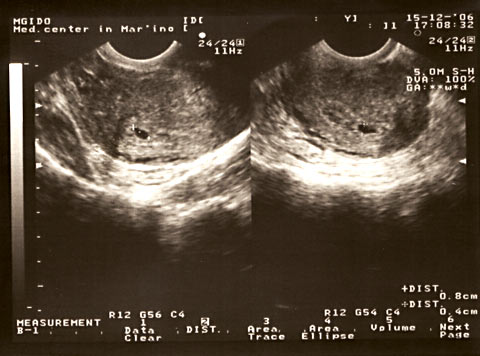
ultrasound at 3 weeks pregnant
But if an ectopic pregnancy is suspected, it is based on the results of the ultrasound that the place of attachment of the embryo will become clear and a decision will be made on further actions. For greater reliability, ultrasound can be performed transvaginally, that is, through the vagina. The procedure is carried out carefully, carefully and does not cause discomfort.
Pregnancy failures. Symptoms of this at 3 weeks
It happens that the blastocyst cannot attach to the wall of the uterus. In this case, after some time she dies and comes out with blood. From this period, a new menstrual cycle begins its report, and the pregnancy is terminated in the third week. The discharge is abundant, sometimes with barely noticeable fetal cells.
During the period of implantation of the blastocyst, as described above, light bleeding may appear, which is mistaken for menstruation by a woman. If the discharge becomes thicker and more abundant, you should immediately visit a doctor to determine the condition of the fetus and help it overcome the crisis if necessary.
The problem of miscarriages lies in the male cell, which is foreign to the female body. However, nature has prepared protection for this case, because giving birth to a child is the main task of a woman. The blastocyst is protected by a mechanism for producing a special protein, which is classified as an immunosuppressive protein that lowers immunity. From the beginning of its journey through the fallopian tubes in the 3rd week of pregnancy, it suppresses the woman’s immunity so as not to die. It is worth noting that pregnancy does not always persist. In many cases, the third week of pregnancy becomes a turning point in the development of pregnancy or its termination.
Will there be any discharge?
During the third week of pregnancy, any special discharge is not typical. During an obstetric count, relatively thick and dense mucus may be released. It protects the egg from external infections - what if conception happens or has it already happened?
Strong mucous discharge, especially with an unpleasant odor, can be a signal of illness . It's better to check with a doctor.
As the fetus implants, minor implantation bleeding may occur. This is just a faint brown discharge or pink or bloody smears.
If you are in the third week of conception, the pregnancy is confirmed, and suddenly blood starts to flow, this may mean a miscarriage.
Body temperature: the line between normal and disease
If the embryonic period is three weeks, a slight increase in temperature (37.2 ° C) without signs of a cold is normal. However, 37.5 or more is already a danger signal.
When visiting a doctor, a woman must warn him about a possible or confirmed pregnancy. The doctor will take this into account when choosing treatment methods.
For many people, a cold is a mild illness that can be treated on their own. Including antibiotics. This is 100% unacceptable for a pregnant woman. Antibiotics, even topical ones, should only be prescribed by a doctor. And he can do this only in the most extreme and severe cases. Side effects of this group of drugs can cause many different complications in the embryo.
Nutrition for the expectant mother
You should not listen to those who recommend “eating more often and more.” The nutrition of a pregnant woman should be carefully calculated and complete . The main recommendations are the same as when planning or at an earlier date.
- Meals are small, 4-5 times a day.
- For the full presence of protein, you need lean meat and, on the contrary, fatty fish (it contains important acids), as well as legumes and dairy products. Mushrooms are also a protein, but such food can be hard on the stomach.
- Fresh vegetables and fruits - to provide vitamins and microelements. No pharmaceutical vitamin complex will be truly effective if the mother does not receive natural vitamins from food.
- No colorful sodas! This is zero benefit and a lot of calories.
- It is advisable to abandon white buns and switch to coarse bread.
Another nutritional recommendation will help expectant mothers with early toxicosis .
An attack of nausea can occur anywhere: at work, while walking, on public transport. Sometimes it “rolls over” so much that a woman’s strength literally leaves her. In addition, vomiting in public places is a strong psychological stress. What to do? It is advisable to experimentally find that “yummy” that will help suppress an attack of nausea. It could be anything. A bottle of carbonated mineral water will help if stomach acidity increases during nausea. Someone carries an apple with them in a plastic bag and bites off little by little when nausea sets in. A piece of cheese, a cracker or something else may help - the expectant mother needs to experiment carefully.In case of sudden vomiting, it is better to carry a special bag and wet wipes in your purse.
We recommend that you read the detailed article on toxicosis >>>
Other “dos” and “don’ts”
An expectant mother can and should take care of herself and her unborn baby. This should be done in all cases: if pregnancy is planned, allowed or has already been detected. The main recommendations are the same as in the first and second weeks:
- Taking vitamins. The doctor must decide which medications are needed.
- If for some reason alcohol and cigarettes are still present in a woman’s life, they need to be “banished” immediately and for a long time. In the third week from conception, any negative factors are dangerous for the embryo.
- Every effort must be made to avoid nervous shock. Only positive emotions. But they should not be excessive. Having experienced some kind of moral uplift, the expectant mother may note with great surprise that she becomes very tired even from positive experiences.
- Do not lift heavy objects or perform difficult physical work. If the expectant mother plays sports, the load will have to be reconsidered, or even change the type of activity. Most often, expectant mothers are recommended swimming (for their own pleasure) and yoga.
In the third week from conception, it is important for the expectant mother to remember: she is now not alone and shares everything that happens to her with her baby. Paying attention to yourself will make the third week of waiting joyful and happy.
← Week 2 Week 4 →
Pregnancy 3 weeks
If this did not happen earlier, then it is at the beginning of the 3rd week that conception will occur.
If your egg has already been fertilized by a sperm at this point, then for about a week it moves through the fallopian tubes, continuously dividing and multiplying.
And now, at the 3rd week of pregnancy, it will attach to the wall of the uterus, and from now on we will talk about the fact that pregnancy has occurred and the fetus is developing in your womb.
The fetus at the 3rd week of pregnancy is so small that it’s hard to even imagine: only 2-3 mcg in weight and 0.15-0.2 mm in length. But by this moment it had grown disproportionately and increased in size compared to the egg.
After fertilization, it began to be called a zygote and began to rapidly divide, forming more and more new cells. The zygote resembles a mulberry, which constantly increases in size.
On days 7-12 of its journey through the fallopian tubes, the zygote reaches the uterus and begins to settle into a permanent place of residence. And after that it will be called a blastocyst.
The blastocyst is constantly in the process of development and growth. Very soon it becomes hollow inside and lengthens. Then an embryonic disk is formed in it, which by the end of 3 weeks will curl up into a cylinder with ends of different widths: a head will begin to form on one of them, and a tail on the other. Even though the embryo is still very small and primitive, the main organs and systems are already being formed.
At 3 weeks of pregnancy, the fetus is just trying to settle in your body, which still perceives the little one as a stranger. There is something like a struggle going on between them, and if a compromise is found, then very soon you will find out about the pregnancy.
Feel
Some women say they can feel their pregnancy now. Doctors do not rule out such “intuitive providence,” but still believe that there are no pronounced sensations at such an early stage.
The first signs and symptoms described, as well as the changes in the body that occur during the 3rd week of pregnancy can be characteristic of each month at the end of the menstrual cycle.
The most common sensations women experience during the 3rd week of pregnancy are nausea, dizziness, weakness, increased breast sensitivity, and changes in appetite. But still, the majority do not feel anything at all.
A home pregnancy test at 3 weeks of pregnancy is unlikely to show you the real picture. The period is still too short to determine an elevated hCG level, and the delay has not yet occurred.
But in some cases, when you are expecting this pregnancy and ovulation was earlier than in the middle of the cycle, an ultra-sensitive test may show a weak second line. And even then this would most likely mean confusion with the timing.
It makes sense to carry out a pregnancy test only after a delay.
HCG at 3 weeks of pregnancy
At the 3rd week, it is better not to rely on a home test: an increase in hCG levels at the 3rd week of pregnancy can only be “detected” in the blood by taking a hCG test no earlier than on the 12th day after conception or 2-3 days after a missed period . The concentration of hCG in the blood in the early stages doubles every 2-3 days, but reaches a diagnostic level only by this time.
At 3-4 obstetric weeks (or 1-2 weeks from conception), the hCG level already reaches 25-156 mU/ml, but this is the concentration in the blood serum, and in the urine it is much lower. Therefore, if hCG is determined at the 3rd week of pregnancy, then not using a test, but using a laboratory analysis.
Analyzes
If your pregnancy was diagnosed so early, some tests may be scheduled for you now. In particular, an analysis for hCG at the 3rd week of pregnancy will show how it develops (that is, whether it has occurred accurately), will help determine the duration of pregnancy and predict the number of embryos - it proportionally affects the level of hCG in the blood serum.
In addition to hCG, the corpus luteum continues to synthesize progesterone, also called the pregnancy hormone. Progesterone prepares the uterus for the settlement of an embryo and affects the nervous system of the expectant mother, creating the most favorable conditions for the preservation and development of pregnancy, therefore, at the slightest risk or threat, the woman will be referred for this analysis.
Ultrasound
You can also undergo an ultrasound at 3 weeks of pregnancy if you have any suspicions. At this stage, the study is carried out with a transvaginal sensor.
An ultrasound at 3 weeks of pregnancy can show (although not necessarily) where the embryo has settled (that is, the resulting pregnancy develops in the uterus or ectopically), and can also assess the condition of the muscle tissue of the uterus, which is of great importance in prognostic terms.
But in practice, the 3rd week of pregnancy for most women passes in the most ordinary way, like “pre-pregnancy” life: they are waiting for the onset of their next period and have not yet thought about hCG and ultrasound.
Periods and bleeding at 3 weeks of pregnancy
It may happen that for some reason the blastocyst will not be able to attach to the wall of the uterus. If it is rejected, then the woman will simply start bleeding, which will mark the beginning of the next menstrual cycle, even if it is still too early for the start of menstruation.
In approximately 20-30% of cases, women continue to have spotting every month on the days of their expected period, despite an existing pregnancy. As a rule, in such cases the woman does not even realize that a new life is developing inside her. This phenomenon is called fetal ablution or color pregnancy.
Often women mistake implantation bleeding for menstruation, which does not pose any threat. But if the spotting becomes more intense and bright in color, then you need to urgently go to the hospital if you already know about your pregnancy by this time. Most likely, we are talking about the threat of miscarriage.
Miscarriage
The fertilized egg is a foreign body for the female body, primarily due to male cells. And he tries to get rid of it, as he would do in any other case.
However, nature is so wise that it has invented a special mechanism to prevent such an undesirable outcome of events: the blastocyst produces a special immunosuppressive protein that lowers the woman’s immunity, and as a result, her body cannot fight the “invader.”
But unfortunately, the embryo does not always win. There are a number of factors that can cause a miscarriage at 3 weeks of pregnancy. And one of them is alcohol.
Alcohol
The 3rd week of pregnancy is decisive for the fertilized egg. It will either reach its intended goal, penetrate into the uterine cavity and live, or be rejected and die. Now the blastocyst is very vulnerable to external factors - natural selection occurs.
She will survive if she turns out to be strong enough and of good quality, so to speak. Alcohol can speed up this test: a weak blastocyst is unlikely to withstand its blow. But if you drank alcohol during the 3rd week of pregnancy without knowing about its development, then you should not worry too much.
If the embryo survives, then everything will be fine. Just from now on you need to take care - after 3 weeks the formation and formation of the most important organs and systems of the fetus begins, and the embryo itself will depend on you in everything and receive through the bloodstream all the substances entering your body.
Alcohol (especially in large quantities) can cause the development of various anomalies and deformities.
Cold
From the very first weeks of pregnancy, you should not only lead a healthy lifestyle, but pay increased attention to your health in general. With a weakened immune system, you can easily catch a cold or the flu. This is now very undesirable.
However, do not despair if you find out that you had a cold at 3 weeks of pregnancy. It is believed that for 18 days after conception, the unborn child is protected from exposure to harmful factors, including medications.
Only after successful implantation does the egg begin to feed from the mother, having exhausted its reserves by this time.
If you already know about pregnancy at 3 weeks, then do not rush to diagnose yourself with ARVI. Perhaps this is how the first signs appear, which may include nasal congestion, cough and even fever.
Temperature at 3 weeks of pregnancy
If you regularly measure your basal temperature, then by this time you know for sure that pregnancy has occurred: for more than 3 days in a row it rises above 37C.
But sometimes you can even measure a low-grade fever under your arm, wondering where it came from or thinking that you are starting to get sick, because weakness has appeared, fatigue, nausea, and headache... A slight increase in temperature in the first weeks of pregnancy is the absolute norm - so the body reacts to the changes happening to it. It's another matter when you have a fever - about 38 degrees or even more. Try to do without using medications - apply compresses, drink plenty of warm liquids. But if the high temperature persists and does not fall, then you need to act. This condition may not be safe for pregnancy and the fetus, so you should consult your doctor, but under no circumstances take aspirin-containing medications during pregnancy.
Source: https://beremennost.net/content/srok-beremennosti-3-nedeli

